Are you looking to invest in the fast-growing artificial intelligence (AI) sector like AI ETF? With AI companies continuing to disrupt industries and technologies advancing daily, now is an excellent time for investors to capitalize on this evolution.
In this blog post, we’ll look into seven of the best Artificial Intelligence ETFs available in 2023 that can help build a portfolio centered around investing in AI.
We’ll discuss what these funds are composed of and why they may benefit investors wanting exposure to disruptive forces like machine learning, neural networks, natural language processing, various forms of deep learning algorithms, and more.
So whether you’re trying to diversify or want valuable insights into potential growth opportunities – let’s get started!
Table of Contents
- What is an AI ETF?
- What is the Best AI ETF?
- Global X Robotics & Artificial Intelligence ETF (BOTZ)
- ROBO Global Robotics and Automation Index ETF (ROBO)
- iShares Robotics and Artificial Intelligence ETF (IRBO)
- Global X Artificial Intelligence & Technology Intelligence ETF (AIQ)
- First Trust NASDAQ Artificial Intelligence ETF (ROBT)
- Ark Autonomous Technology & Robotics ETF (ARKQ)
- ETFMG AI-powered Equity ETF (AIEQ)
- Does Vanguard Have an AI ETF?
- What is the Best ETF for Artificial Intelligence?
- Conclusion
What is an AI ETF?

In the investment world, new and exciting products are constantly emerging. One such product is the AI ETF or exchange-traded fund.
AI ETF focuses on investing in companies that use and develop artificial intelligence. AI ETFs typically hold value stocks from technology, healthcare, financial services, and other industries actively using or developing AI-powered products and applications.
This type of ETF invests in companies specializing in developing and using AI technologies, ranging from industrial robotics to machine learning, natural language processing, and computer vision.
Investing in an AI ETF allows investors to diversify their portfolios and tap into the potential of the fast-growing investment strategy. It’s important to note that, like any investment, an AI ETF carries risk, and investment strategies should always be cautiously approached.
These funds aim to expose investors to companies most likely to benefit from the growth of artificial intelligence technologies.
What is the Best AI ETF?

Artificial Intelligence (AI) ETFs have been gaining in popularity in recent years as investors look to capitalize on the potential growth of this innovative technology sector.
With several options available, it can be challenging to determine which ETF is the best. Factors to consider include cost, diversification, and the specific companies in the funds’ portfolios.
However, we’ve compiled a list of some of the best artificial intelligence ETFs in the AI market:
Global X Robotics & Artificial Intelligence ETF (BOTZ)
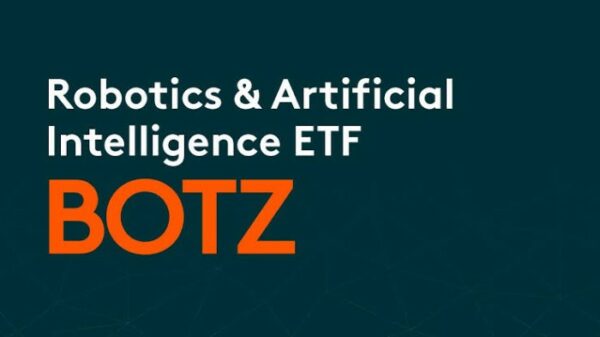
The first AI ETF on our list that can potentially stand to benefit from increased adoption and utilization of robotics is the Global X Robotics & Artificial Intelligence ETF (BOTZ). Investing in artificial intelligence (AI) and robotics has become a popular trend in the stock market, with the Global X ETFs being one of the top choices among investors.
This AI ETF invests in companies developing AI and automation technologies, from health care to manufacturing. The growth potential of the AI and robotics industry is significant, as it is expected to have a massive impact on various industries.
With people increasingly relying on automated systems and machines, investing in the Global X Robotics & Artificial Intelligence ETF can potentially provide high returns for those interested in the burgeoning field of AI and robotics.
BOTZ currently holds 44 stocks, and its largest holdings include Keyence, Fanuc, Intuitive Surgical, ABB, and NVIDIA, which accumulated 40% of the fund’s assets as of December 2020.
Pros
Cons
ROBO Global Robotics and Automation Index ETF (ROBO)
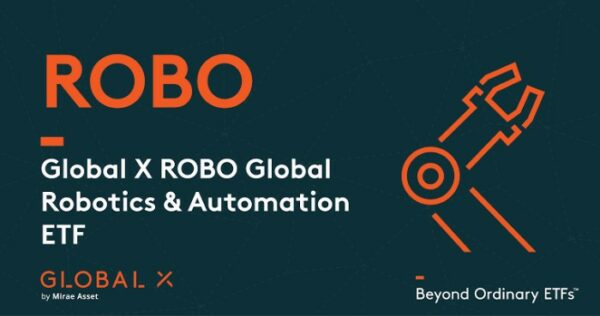
The ROBO Global Robotics and Automation Index ETF is one of the market’s largest and most traded AI ETFs. This fund tracks the ROBO Global Robotics & Automation Index, including companies specializing in robotics, automation, and artificial intelligence.
Examples include those companies engaged in autonomous vehicles, healthcare robots, 3D printing, and more.
ROBO currently holds 80 stocks, with the most significant holdings being IPG Photonics, Kardex Holding, Samsung Electronics Co. Ltd., ASML Holding N.V., and Harmonic Drive Systems.
ROBO also has a low expense ratio of 0.95%, making it one of the most cost-effective robotics companies in the market.
Pros
Cons
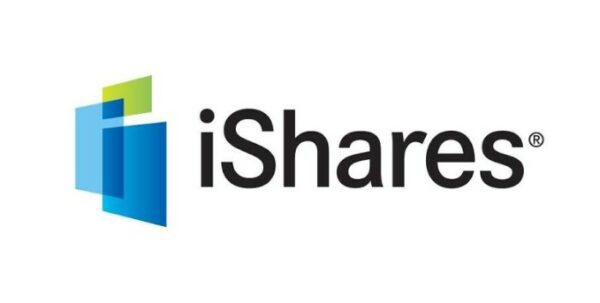
The iShares Robotics and Artificial Intelligence ETF is another popular choice among investors. This AI ETF invests in tech companies globally that are actively managed fund and engaged in robotics, automation, and other technologies related to artificial intelligence.
Examples of such companies include manufacturing firms producing intelligent robots, software providers offering machine-learning solutions, and those producing 3D printing materials and autonomous vehicles.
IRBO holds more than 200 individual securities, with its most significant holdings being ABB Ltd., Meitu, IQIYI, Spotify,and Sumo Logic.
The low expense ratio of 0.47% makes this ETF one of the most cost-effective AI ETFs in today’s global robotics market.
Pros
Cons
Global X Artificial Intelligence & Technology Intelligence ETF (AIQ)

The Global X Artificial Intelligence & Technology Intelligence ETF is one of the newest AI ETFs on our list. This fund provides portfolio exposure to the increasingly popular artificial intelligence and technology sectors, transforming various industries globally.
This AI ETF fund invests in tech companies engaged in machine learning, natural language processing, robotics engineering, data analytics, and more.
As of December 2020, AIQ holds 40 stocks, with the most extensive holdings being NVIDIA Corporation, Microsoft Corporation, Alphabet and Apple Inc., Meta Platforms, and Tesla Inc.
With its low expense ratio of 0.68%, the Global X Artificial Intelligence & Technology Intelligence ETF is an excellent choice for investors seeking broad exposure to the AI industry.
Overall, these four AI ETFs provide a wide range of portfolio options for those interested in investing in the robotics and artificial intelligence sector.
Pros
Cons
First Trust NASDAQ Artificial Intelligence ETF (ROBT)
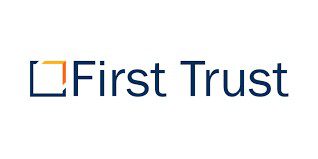
Investing in the artificial intelligence sector can be daunting, but the First Trust NASDAQ Artificial Intelligence ETF (ROBT) simplifies the process.
With a portfolio of companies solely focused on AI, ROBT invests in businesses driving the future of technology. From chip makers to software developers, ROBT’s diverse holdings expose various niches within the AI industry.
But what sets ROBT apart from other AI ETFs? A team of experts with extensive experience in the tech industry manages the fund.
Investing in ROBT means investing in a team that understands the potential of AI and its significance for the future.
Pros
Cons
Ark Autonomous Technology & Robotics ETF (ARKQ)
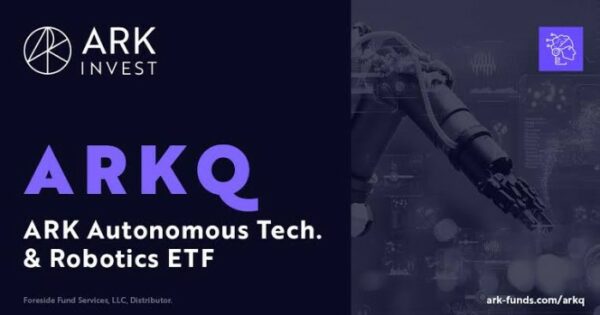
The ARK Autonomous Technology & Robotics ETF (ARKQ) tracks the ARK Autonomous Technology & Robotics Index, which comprises companies involved in robotics, automation, and other related technologies.
ARKQ is a forty-stock portfolio, with some of its top holdings being NVIDIA Corporation, Autoliv Inc., ASML Holding N.V., and Baidu Inc.
ARKQ has a higher expense ratio of 0.75% than the aforementioned ETFs. However, investors can benefit from its highly diversified portfolio that caters to multiple sectors in the AI industry.
Overall, ARKQ is an excellent option for those seeking broad exposure to the robotics and artificial intelligence sector.
Pros
Cons
ETFMG AI-powered Equity ETF (AIEQ)
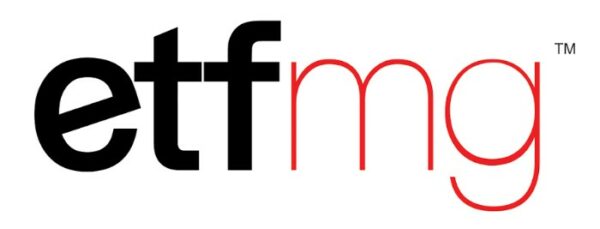
The ETFMG AI-powered Equity ETF (AIEQ) is a cutting-edge fund focusing on companies leveraging machine learning and artificial intelligence technology.
This smart beta fund provides exposure to innovative tech companies across the globe and uses proprietary algorithms to select its holdings.
Regarding individual stocks, AIEQ’s most significant holdings are Microsoft Corporation, Alphabet Inc., and Apple Inc.
AIEQ has a low expense ratio of 0.70%, making it a cost-effective choice for investors seeking exposure to the robotics and artificial intelligence sector.
Overall, the ETFMG AI-powered Equity ETF is an excellent option for those seeking to invest in cutting-edge companies driving the future of technology.
Pros
Cons
Other notable AI ETFs include:
- Thematic ETF
- iShares Exponential Technologies ETF
- Indxx Global Robotics ETF
- Morningstar exponential technologies index
Does Vanguard Have an AI ETF?

Vanguard has not yet released an AI ETF but is considering one in 2021. They are researching the potential risks and rewards of investing in this sector.
However, investors can access artificial intelligence stocks through Vanguard’s index funds. These funds provide exposure to large companies like Microsoft and Apple, which are heavily invested in the AI industry.
What is the Best ETF for Artificial Intelligence?

The best ETF for artificial intelligence investments depends on the investor’s goals. When choosing an AI ETF, investors should consider risk tolerance, expense ratio, and diversification factors.
Robotics and Artificial Intelligence ETF (ROBT) is a good choice for those seeking higher growth potential. At the same time, ARK Autonomous Technology & Robotics ETF (ARKQ) is a good option for those seeking more diversification.
The ETFMG AI-powered Equity ETF (AIEQ) is an excellent choice for investors seeking exposure to cutting-edge technology companies. Ultimately, the best AI ETF will depend on each investor’s goals and preferences.
Conclusion
The AI ETF is an exciting and innovative way to take advantage of investing in companies pioneering artificial intelligence.
By offering exposure to a wide range of AI-driven asset classes, this AI ETF provides unparalleled opportunities for investors with a mindset to invest in tech companies. Many experts believe investing in this fund can offer high returns with low risk.
With the recent rise in demand for AI-based products and applications, investing in the AI ETF could potentially bring higher returns than traditional investment options.
Ultimately, it would be best to weigh the potential risks and rewards before deciding whether or not to invest in memory chips for data centers and self-driving cars AI ETF fund.





